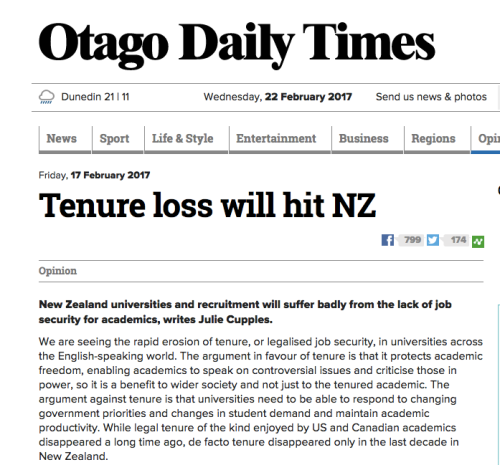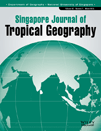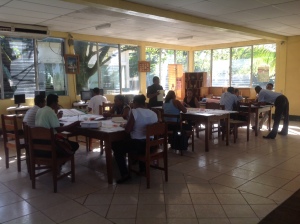
From the UC Chronicle 44(12) 2009
Last Friday I went back to my old department, the Department of Geography at the University of Canterbury, to attend the retirement party of Professor Eric Pawson, my former PhD supervisor, colleague and head of department. I wasn’t asked to speak at the event, which is fine because lots of other people did, but I would like to acknowledge publicly how fortunate I was to have worked with Eric for almost 15 years from the late 90s until my departure from Canterbury at the end of 2012. I also want to do so because of a sense that Eric’s style of leadership is something that is sadly in increasingly short supply in the neoliberal university and it is worth reflecting on why it is that is so and how things might be different.
As a PhD supervisor, Eric was wonderful. Although we were both cultural geographers, our research interests were quite different. But he took my feminist thesis on single motherhood in post-revolutionary Nicaragua in his stride and managed to give me lots of academic freedom – something I feel I might not have had to the same extent if I’d stayed in the UK to do my PhD – while also providing significant intellectual input. I didn’t appreciate until later how such a balance is really difficult to achieve. His supervision always felt constructive and Eric never allowed me to doubt my work or myself, although would quite sternly draw attention to my weaknesses, such as whenever I was taking my feminist hyper-reflexivity too far.
As a member of the academic staff after my PhD, Eric was fundamental in helping my career to develop. He is the best head of department I have ever had by far. Given the way that things are changing in higher education, it is likely too that he will be the best I will ever have. Unlike many heads in contemporary institutions across the UK and New Zealand, Eric did not buy into the culture of audit and surveillance that pervades our institutions. He never internalized the “line manager” subject position; he was always a colleague, mentor and advisor rather than someone engaged in “performance management”. He never believed that academics need to be constantly surveilled and always made to feel a bit anxious, because otherwise we will get up to no good. As head, Eric was a senior scholar that cared about people and geography, and about both teaching and research. And his efforts went into maximizing us as researchers and teachers, giving us both autonomy and unconditional support, which was the most effective way to achieve what might now be referred to as “excellence” or “impact”. Of the many complimentary things said about Eric on Friday, one was that he was “on everybody’s side”. That is a form of leadership that I think is increasingly endangered.
Eric was the anti-neoliberal embodiment of the managerial approach. He always maintained a healthy ironic stance towards the neoliberal university and as head he sought bottom-up practical solutions to the challenges that faced us as academics or as a department. Decisions were taken collectively and democratically rather than being imposed in a top-down way. Even when you disagreed with the way forward, you could live it with what was decided because you’d been included in the deliberations. He trusted us completely as colleagues and professionals – any modes of surveillance came from elsewhere (TEC, College, PBRF) but never from Eric. We published a paper together on the PBRF (the New Zealand equivalent of the REF) based on our experiences. Despite the different ways in which we were located in this process, we both saw it as something unfortunate to be negotiated, subverted and turned to our advantage. As Liz Morrish and others have noted writing on UK universities, in many institutions the REF has become a toxic instrument of discipline used to impose unattainable and stress-inducing targets, the casualties of which are staff wellbeing at work, collegiality and learning conditions for our students. Leadership for Eric was however about reflecting with us on the intellectually impoverishing dynamics of instruments such as PBRF and striving to keep their negative impacts to a minimum, while working to help us achieve the highest possible scores we could. To the best of his ability, Eric always tried to remove the obstacles – financial, practical, and intellectual – that stood in the way of my achieving my potential. He helped me to get promoted and was my strongest advocate during those processes. He told me frequently that I was trying to do too much and should cut down. He made sure that I got the funding I needed, especially for fieldwork in Nicaragua, and that I got to do the teaching and research I cared about. He was enthusiastic about my successes, indeed about everyone’s successes, while never engaging in acts of self-promotion himself. I’m especially grateful for the good work we did together – including the special issue of the New Zealand Geographer in 2009 (see image), the 2010 New Zealand Geographical Society conference in Christchurch, the PBRF article, the successful prevention of a forced merger with the Department of Geology – and for his support in helping me to get the Marsden grant on media convergence (that in the end I had to do away from Canterbury) and for letting me reschedule classes right in the middle of the teaching semester so I could go to the UK when my sister had an accident. I realize that Eric’s leadership provides me with resources for thinking about how we can do the kinds of things that Liz Morrish is talking about, how we can make things more sane for ourselves, our colleagues and our students, while still doing excellent research and teaching.
So I am grateful to have had Eric as a colleague and mentor for so long and for the self-affirming and positive environment in which I got to work for a number of years thanks to him. I am also grateful for the good advice on so many matters, and the ongoing support that he has given to both me and Kevin since our departure from UC.
Have a happy retirement, Eric, you really deserve it.



